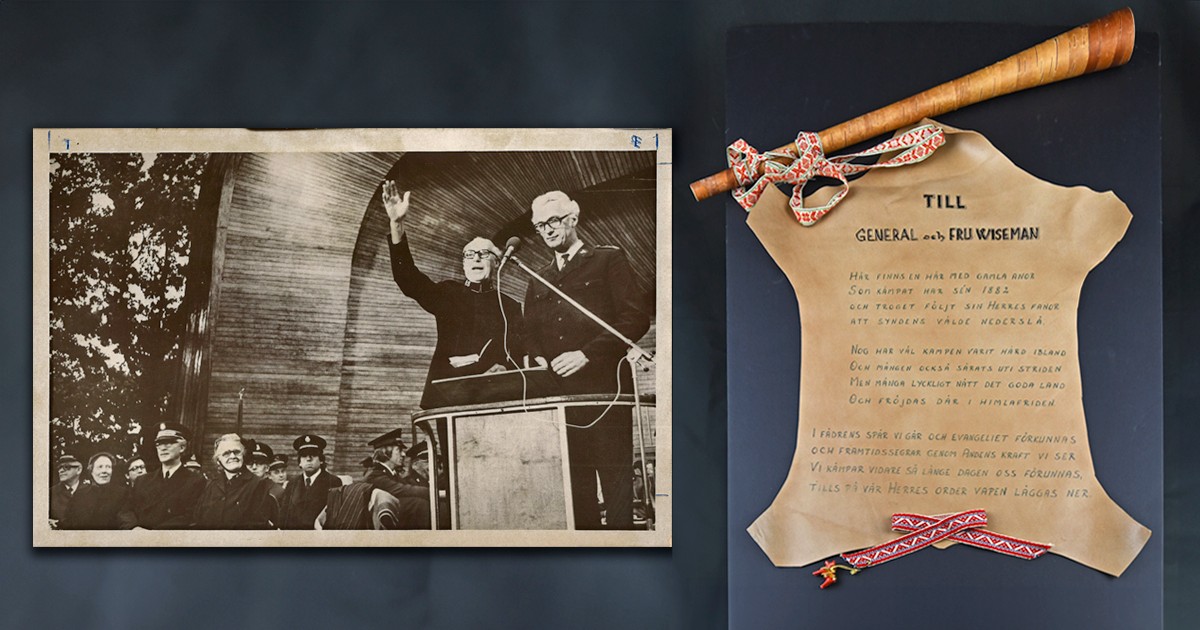If any word raises red flags, it's obedience. Doesn't it simply confirm the view that Christian faith is mainly a matter of keeping rules, of obeying without question? And yet The Salvation Army's ninth doctrine firmly insists: We believe that continuance in a state of salvation depends upon continued obedient faith in Christ. What seems problematic at first glance may well be significant for our practice of faith today. But we need to unpack this idea.
Let's acknowledge first that unquestioning obedience is dangerous. A boss demanding such obedience can create a culture of fear, as some CBC employees discovered over the past few years. A marriage is on rocky ground when one of the partners demands obedience. But this is not the kind of obedience that characterizes Christian faith.
Also, a demand for obedience may not be the best way to accomplish something. When it's time for our six-year-old grandson to leave the house, I say: “Dylan, put on your boots and coat. It's time to go.” Nothing happens. My wife, Cathie, turns to him and says: “Dylan, let's play a game. I'm going to count to 10. See if you can get your boots on before I reach that number.” Guess who gets the job done?
What, then, does obedience have to do with faith? When we think of what characterized the life of Jesus, we may think of compassion and grace. Without detracting from their importance, it may surprise us to realize that the New Testament also views his obedient responses as paramount. Jesus' first spoken words in the Gospel of Luke are those of a precocious 12-year-old to his parents: “Did you not know that I must be in my Father's house?” (Luke 2:49 NRSV). Must. Obedience.
When creating his majestic hymn on the mind of Christ, the Apostle Paul focuses attention on the fact that Jesus “became obedient to the point of death—even death on a cross” (Philippians 2:8 NRSV). This has led some New Testament scholars, such as Richard Longenecker, to argue that Christ's obedient faith stands as a “foundational conviction” for the early church.
How, then, can we hear the words of this core conviction so that they function as intended? First, we might think of occasions when we are reluctant to follow somebody's directions for us because we don't understand them. When I teach a young person to play a brass instrument, I ask them to do something they don't understand. The budding musician knows nothing of the physics of sound (and I know just as little!) but he is willing to follow my instructions and do what I say. By practising the fundamentals, he eventually learns to understand key signatures and read the music of Colonel Robert Redhead or Mozart. Understanding develops as we obey instructions; we learn as we do. Retired theology professor Charles Wood has expressed it this way: “Obedience is not a substitute for knowledge…. It is simply a way to knowledge.” It was as Peter and the other disciples followed Christ in obedience that they gradually came to understand who he was and the salvation he offered.
And yet there are occasions when we do understand but draw back at the implications. In his own critical moment of facing the consequences of obedience, Jesus prayed on the Mount of Olives: “Father, if you are willing, remove this cup from me; yet, not my will but yours be done” (Luke 22:42 NRSV). Then he turned to face his betrayer and his opponents knowing full well what awaited him. He took the next step.
When General John Larsson (Rtd) was a young officer, he went through a dark moment himself. As he recounts in his book, Saying YES to LIFE, it was the late 1960s, and his work on the musical, Take-Over Bid, was demanding much of his time, in addition to the responsibilities of being a corps officer. Just as the musical reached its production point, Larsson went through what he has called a “desert experience.” In contrast to his spiritual yearnings, he found himself in a “dark tunnel.” He sought wise counselling. In his words, “It was by the grace of God … that I still obeyed. I simply went on.” There are times when obedience simply means to take the next step.
Christian faith is obedient faith. Obedience is our response to God's grace, not its polar opposite. Together they constitute the dynamic of salvation.
Major Ray Harris is a retired Salvation Army officer. He lives in Winnipeg where he obeys the instructions when baking banana-cranberry loaves. Convictions Matter, Major Ray Harris' book, is available at store.salvationarmy.ca. For the e-book, visit amazon.ca.
Let's acknowledge first that unquestioning obedience is dangerous. A boss demanding such obedience can create a culture of fear, as some CBC employees discovered over the past few years. A marriage is on rocky ground when one of the partners demands obedience. But this is not the kind of obedience that characterizes Christian faith.
Also, a demand for obedience may not be the best way to accomplish something. When it's time for our six-year-old grandson to leave the house, I say: “Dylan, put on your boots and coat. It's time to go.” Nothing happens. My wife, Cathie, turns to him and says: “Dylan, let's play a game. I'm going to count to 10. See if you can get your boots on before I reach that number.” Guess who gets the job done?
What, then, does obedience have to do with faith? When we think of what characterized the life of Jesus, we may think of compassion and grace. Without detracting from their importance, it may surprise us to realize that the New Testament also views his obedient responses as paramount. Jesus' first spoken words in the Gospel of Luke are those of a precocious 12-year-old to his parents: “Did you not know that I must be in my Father's house?” (Luke 2:49 NRSV). Must. Obedience.
When creating his majestic hymn on the mind of Christ, the Apostle Paul focuses attention on the fact that Jesus “became obedient to the point of death—even death on a cross” (Philippians 2:8 NRSV). This has led some New Testament scholars, such as Richard Longenecker, to argue that Christ's obedient faith stands as a “foundational conviction” for the early church.
How, then, can we hear the words of this core conviction so that they function as intended? First, we might think of occasions when we are reluctant to follow somebody's directions for us because we don't understand them. When I teach a young person to play a brass instrument, I ask them to do something they don't understand. The budding musician knows nothing of the physics of sound (and I know just as little!) but he is willing to follow my instructions and do what I say. By practising the fundamentals, he eventually learns to understand key signatures and read the music of Colonel Robert Redhead or Mozart. Understanding develops as we obey instructions; we learn as we do. Retired theology professor Charles Wood has expressed it this way: “Obedience is not a substitute for knowledge…. It is simply a way to knowledge.” It was as Peter and the other disciples followed Christ in obedience that they gradually came to understand who he was and the salvation he offered.
And yet there are occasions when we do understand but draw back at the implications. In his own critical moment of facing the consequences of obedience, Jesus prayed on the Mount of Olives: “Father, if you are willing, remove this cup from me; yet, not my will but yours be done” (Luke 22:42 NRSV). Then he turned to face his betrayer and his opponents knowing full well what awaited him. He took the next step.
When General John Larsson (Rtd) was a young officer, he went through a dark moment himself. As he recounts in his book, Saying YES to LIFE, it was the late 1960s, and his work on the musical, Take-Over Bid, was demanding much of his time, in addition to the responsibilities of being a corps officer. Just as the musical reached its production point, Larsson went through what he has called a “desert experience.” In contrast to his spiritual yearnings, he found himself in a “dark tunnel.” He sought wise counselling. In his words, “It was by the grace of God … that I still obeyed. I simply went on.” There are times when obedience simply means to take the next step.
Christian faith is obedient faith. Obedience is our response to God's grace, not its polar opposite. Together they constitute the dynamic of salvation.
Major Ray Harris is a retired Salvation Army officer. He lives in Winnipeg where he obeys the instructions when baking banana-cranberry loaves. Convictions Matter, Major Ray Harris' book, is available at store.salvationarmy.ca. For the e-book, visit amazon.ca.










Leave a Comment